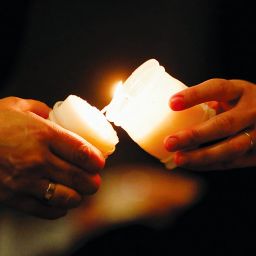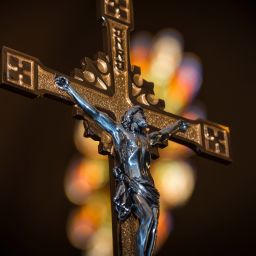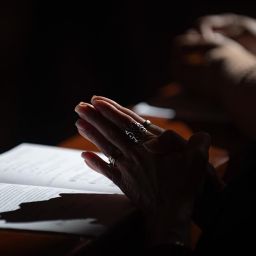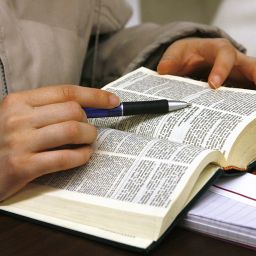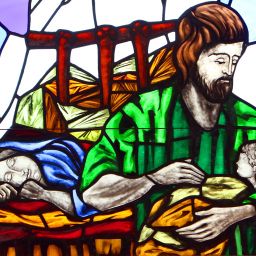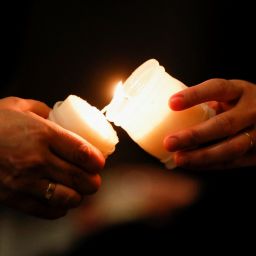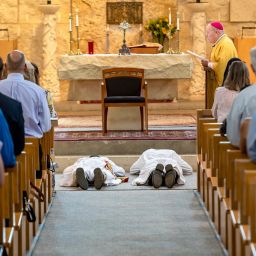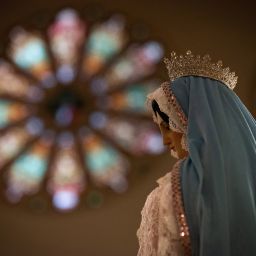By Father Thomas Esposito, O. Cist.
Special to The Texas Catholic
The Our Father is the most familiar of all Christian prayers. Its constant recitation inevitably leads to a glazing of our mental eyes, rendering us numb to the shocking permission Jesus grants us in the opening words. He invites us, even requires us, to claim familiarity with God. “Pray like this,” Jesus tells those gathered for His Sermon on the Mount: “Our Father, who art in Heaven…” (Matthew 6:9).
The mythological gods of other nations begat children in (mostly illegitimate) abundance. Egyptian pharaohs and Babylonian kings were sons of their respective sun and sky gods, but all other human beings were slaves created to serve their divine masters. Aristotle’s Unmoved Mover was far too excellent and distant to bother with puny mortals.
Israel, by contrast, defined itself by its unique relationship to God: “For what great nation is there that has gods so close to it as the Lord, our God, is to us whenever we call upon Him?” (Deuteronomy 4:7). Yet we rarely find the phrase “our Father” in the Old Testament, even though paternal attributes of generating, providing for, and forming are frequently applied to God. The two instances are both in the later chapters of Isaiah: 63:16 (“For you are our father. / Were Abraham not to know us, / nor Israel to acknowledge us, / You, Lord, are our father, / our redeemer you are named from of old”) and 64:7 (“Yet, Lord, you are our father; / we are the clay and you our potter: / we are all the work of your hand”).
With these insights as background, we can return to the startling start of the prayer that Jesus establishes as the foundation for all Christian prayer. That Jesus authors this prayer for us is the essential point; by instructing us to address God as “our Father,” Jesus introduces His disciples then and now into the mystery of His own being. He alone can say “my Father,” given that “No one knows the Son except the Father, and no one knows the Father except the Son and anyone to whom the Son wishes to reveal Him” (Matthew 11:27). Thanks to the Incarnation of the eternal Son, the default prayer He teaches His disciples contains the beautiful assertion and daily reminder of our unique share in the divine nature (2 Peter 1:4).
That we are adopted sons and daughters of God the Father, a fact made possible by the Death and Resurrection of Christ, is a cornerstone of St. Paul’s thought. Within the first two decades of the Church’s life, he had already sketched the contours of Christian theology: “As proof that you are children, God sent the spirit of His Son into our hearts, crying out, ‘Abba, Father!’ So you are no longer a slave but a child, and if a child then also an heir, through God” (Galatians 4:6-7). He expresses this same truth in Romans 8:14-15: “For those who are led by the Spirit of God are children of God. For you did not receive a spirit of slavery to fall back into fear, but you received a spirit of adoption, through which we cry, ‘Abba, Father!’” In both passages, Paul clearly outlines the roles of each Person of the Trinity in connection with our noble identity as children of God.
Saint Ignatius of Loyola’s biographer noted that he was often unable to progress beyond the words “our Father” without pausing and even weeping for minutes at a time, so profound was his amazement at his privileged share in the mystery of God’s inner life. We complicated moderns might balk at such a pious expression, thinking it impossible or virtue-signaling. Given our disdain for any statement smacking of patriarchal authority, some might even think it dangerous or absurd to portray God as a father figure, however benevolent. Yet there is a summons behind these words, a glorious challenge to embrace, in the words our Savior taught us. What if I lived as if I had a Father who loved me, no matter my relationship to my earthly father? What if I prayed the Our Father as if I knew I was not alone, but had a vast assembly of witnesses uniting their voices and lives to mine in worship of the God who is love and invites us, invites me, to receive that love?
The next time you begin the Lord’s prayer, pause after you say “our Father.” Those two words are, perhaps, the greatest gift that Christ has given us, for they contain the entirety of the divine mystery.
Father Thomas Esposito, O.Cist., is a monk at the Cistercian Abbey of Our Lady of Dallas and teaches in the theology department at the University of Dallas.
Cutline for featured image: A woman and man join hands for the Our Father during Mass at Jesus the Divine Word Catholic Church in Huntingtown, Md., Feb. 1, 2020. (OSV News photo/CNS file, Bob Roller)


